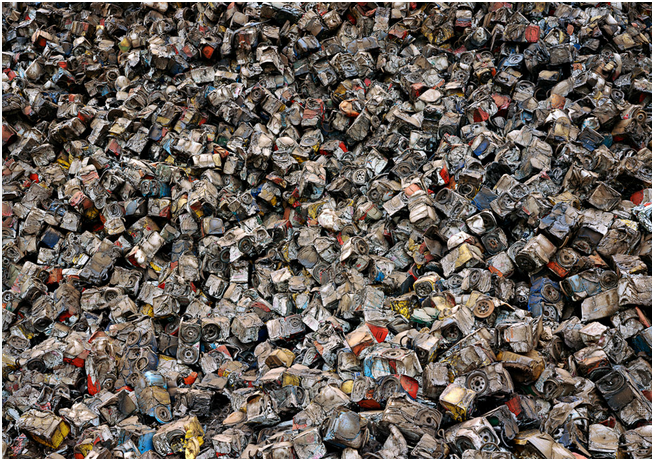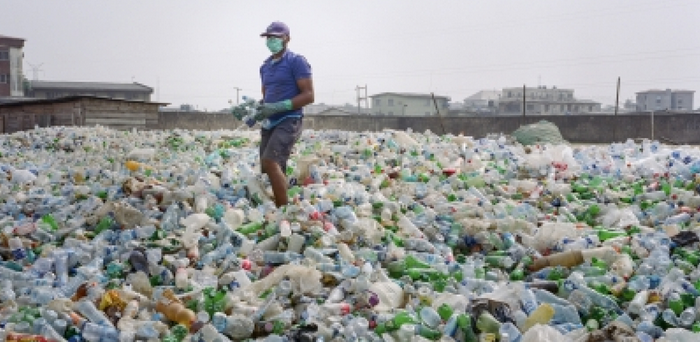 By Ray Rivers
By Ray Rivers
June 2nd, 2023
BURLINGTON, ON
OPINION
I recently attended a Pollution Probe event to honour Edward Burtynsky, the Canadian born world famous photographer and artist known for his large format landscape art work. Former Prime Minister Brian Mulroney, in 2019, received a similar honour for his environmental leadership on acid rain, Great Lakes restoration, the government’s Green Plan and initial efforts on combating climate change.

The stuff we through away has to end up somewhere.
Pollution Probe is generally considered one of the more moderate of the environment organizations. They are not typically known to protest environmental policy by climbing the CN tower or tying themselves to old growth timber and taunting chain sawing loggers. Founded by students and their professors at the University of Toronto in 1969, Probe receives broad support from industry and government as well as concerned individuals.
Probe has an enviable track record in research and bringing together various sectors to a cause. They can point to the banning of DDT; the 3 R’s recycling program; reduced nutrient loading into the Great Lakes; and contributing to the fight against acid rain. Probe is currently undertaking a plastics pollution recovery project in the Great Lakes. Mr. Burtnysky, a soft spoken environmentalist, had recently undertaken an exhibition of his work focusing on plastic pollution. It was a fitting and timely tribute.
The federal government’s commitment to ban the manufacture and importation of a number of single use plastic products, mainly plastic packaging, straws and stir sticks, is in place, though it may take some time before current stocks are depleted. And after that the government’s sights need to focus on the holy grail of plastic pollution – the PET bottle.
Pollution Probe organized a panel to discuss the plastics issue, following Mr. Burtynsky’s address. Notably, there was a representative from NOVA Chemicals on the panel. Nova, a major manufacturer of plastics, is headquartered in Calgary though ownership is offshore in the United Arab Emirates. The debate was cordial; it was clear that in this forum nobody was yet prepared to address the elephant in the room – getting rid of the plastic bottle.

Plastic water bottles
Ethylene, a hydrocarbon gas, is used to produce polyethylene, ethylene oxide, PVC, styrene, and as the name implies, (polyethylene terephthalate) PET bottles. NOVA has a lot to lose were PET bottles the next target, so they talked up their efforts at recycling as a viable solution. But they must understand that those PET bottles raise enough health and environmental questions that banning them for most applications will be the only solution.
For example we all know that you should never leave a water bottle in your car on a hot day since it could leach unsafe levels of antimony trioxide and phthalates, basic building blocks in the production of most PET bottles. And it follows that they probably contaminate what’s inside the bottle to some extent even at lower temperature, and possibly even when frozen.
There is the matter of micro plastics. According to a Penn State study municipal tap water (presumably from sources which also receive wastewater) was shown to contain something like five or six plastic particles per litre of water. But samples taken from bottled water exceeded that by at least 50 times. As the study notes, the researchers are yet unsure about the full health consequences of ingesting that amount of plastic particles; it can’t be good.
Moreover, according to the National Library of Medicine “Almost all commercially available plastic products we sampled—independent of the type of resin, product, or retail source—leached chemicals having reliably detectable [Estrogen Activity] EA, including those advertised as [Bisphenol A) BPA free. BPA is prohibited for use in infant drinking bottles in Canada and the USA. In some cases, BPA-free products released chemicals having more EA than did BPA-containing products.
This type of estrogen is a concern since it mimics or antagonizes naturally occurring estrogens and can produce many biological and adverse health effects in mammals, according to the journal Environmental Health. These include “early puberty in females, reduced sperm counts, altered functions of reproductive organs, obesity, altered sex-specific behaviours, and increased rates of some breast, ovarian, testicular, and prostate cancers”. That should be scary enough to make us want to stop buying plastic bottles used for everything from water to peanut butter.
Finally there is the waste plastic matter, land filled mounds of used bottles and icebergs of plastic floating in our oceans. It is what Edward Burtynsky has captured with his magnificent photography and brought to our attention through his exhibitions.
According to Pollution Probe some 10 million kg of plastic waste enter the Great Lakes each year. Everyone agrees that we should continue recycling plastic. But we all should understand that recycling alone is not enough. It will not be until the plastic revolution is over.
 Ray Rivers, a Gazette Contributing Editor, writes regularly applying his more than 25 years as a federal bureaucrat to his thinking. Rivers was once a candidate for provincial office in Burlington. He was the founder of the Burlington citizen committee on sustainability at a time when climate warming was a hotly debated subject. Ray has a post graduate degree in economics that he earned at the University of Ottawa. Tweet @rayzrivers. Ray Rivers has previously acted as consultant for Pollution Probe and represented the organization at an earlier Congress of the Parties (COP) climate change meeting.}
Ray Rivers, a Gazette Contributing Editor, writes regularly applying his more than 25 years as a federal bureaucrat to his thinking. Rivers was once a candidate for provincial office in Burlington. He was the founder of the Burlington citizen committee on sustainability at a time when climate warming was a hotly debated subject. Ray has a post graduate degree in economics that he earned at the University of Ottawa. Tweet @rayzrivers. Ray Rivers has previously acted as consultant for Pollution Probe and represented the organization at an earlier Congress of the Parties (COP) climate change meeting.}
Background links:
PET –
Pollution Probe Great Lakes Plastic Clean Up –



















Ray, this is dismaying and concerning. I’ve been trying to cut back on my single use plastic and this is a helpful reminder. I’ve been aware of much of this for some time, but convenience falls in the way of my own actions. My water bottle is stainless steel, and I’m trying to reduce waste elsewhere, such as juice purchases.
As you said, so much is distributed in plastic containers, like peanut butter. Making our own would be the only way to cut eliminate much of it. City of Atlanta no longer collects glass recyclables which is disheartening Some of my plastic winds up in the trash, which I’m ashamed to say. Do I really want to thoroughly clean and recycle a peanut butter jar, wasting precious water?
When I was working in a grocery store this past year, a customer asked me what bottled water was best for mixing with powdered infant formula. My response thah I would not trust any of them. For convenience on a road trips purified water in glass bottles would probably be best. I’m stunned someone would ask a grocery clerk for help like this.
Thanks for a critical and interesting piece
Dana
Absolutely excellent and it compels us to action. I deeply hope this receives wide circulation. I look forward to discussions of how to achieve the cultural changes that will be needed to address this issue.
Thanks Ray for your excellent description of the dilemmas we face with plastics we’ve used for decades and ones we are still using despite the urgent warnings to stop. And thank you to M. Ricciardi for joining the commentary with solutions that should be urgently implemented. As usual it is the capitalist system that binds us to old techniques that harm us, while at the same time often promoting better solutions that have to battle entrenched bad practices that are making a few people rich at the expense of harm to the rest of us.
But that’s why we have democracies to balance the competing practices, but only if we elect people who actually give a damn. Often a scarce commodity unfortunately.
Thanks for this important reminder, Ray.
You wrote: “But we all should understand that recycling alone is not enough. It will not be until the plastic revolution is over.”
This is an ambitious goal, to be sure, but realistically, we (humans) will not be abandoning ‘plastics’ (synthetic polymers) anytime soon. Most of the plastic waste already produced is not readily recyclable (due to difficulty in chemical breakdown [known as ‘chemical recycling to monomers’, CRM, and the energy cost of doing so, primarily).
Obviously, existing waste (in landfills, waterways, oceans, etc.) must be dealt with somehow (perhaps through collection/retrieval, ‘gasification’, and capturing/sequestering of carbon slag end-products)…but moving forward, we must replace the monomers (the single molecule ‘feedstocks’ of the plastic polymers [PE, PU, PET, etc.] that make up most present day plastics) with FULLY (100%) recyclable and reusable monomers such as polydiketonenamines (PDKs) , polyacetals, and/or cyclo-octenes. These are proven (‘closed-loop’) polymers with comparable properties to “commodity plastics” (like PE, PU). These, and others being developed, can go FAR in reducing plastic pollution (which is comprised of non-closed loop / non-recyclable to monomer feedstocks).
The main obstacle to employing this is industry ‘entrenchment’ and investment in current (non-CRM) polymer production (and ‘locked-in, high-profit, contracts with the producers of these plastics) and the cost of replacing (and ‘disrupting’) the present technology; plastic industry inertia, if you will.
Awareness of the problem (provided by your excellent writing and that of many others) is vitally important to changing this inertia…but so is proposing viable (realistic) solutions. This requires educating oneself and others about what is possible right now, and, what the main obstacle(s) are to implementing the solution.
I recently received an award from NASA (for the ‘Waste 2 Base Materials’ challenge, 2022) for my proposal/concept design utilizing the fully recyclable, closed-loop polymers noted above. This NASA challenge was focused on a future Earth (or Moon) to Mars, human-occupied, spacecraft mission…if NASA (and other Space agencies) are already working on solutions to the problem of waste production/accumulation on a long-term space mission to another planet, then why are we not doing the same right here on ‘Spaceship Earth’, right now?
Knowledge plus (public) Awareness plus (industry) Motivation can (and must) overcome Inertia.
M. Ricciardi (USA)